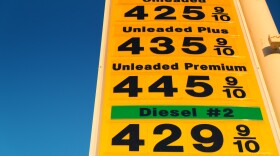CORRECTION: This story has been updated to reflect that HDD fluid is considered a pollutant rather than toxic.
Enbridge's plan to relocate a portion of its Line 5 pipeline in northern Wisconsin could involve a drilling method even the company admits will likely release toxic chemicals into surrounding waters.
Horizontal Directional Drilling (HDD) is a common method for building pipelines under bodies of water, and it sometimes leads to "frac-outs," or drilling-fluid leaks.
Bobbi Rongstad, who lives in northern Wisconsin, said she has serious concerns about the plans to use HDD on Line 5. For her, the issue literally hits close to home, as the oil pipeline would cross under two streams running through her property.
"I used to work in the utility industry, and it's a great thing for shoving a gas line under a sidewalk, not messing up somebody's front lawn," Rongstad explained. "But when they're doing 30-inch pipe and going 60 feet under the bottom of the river, which is what's proposed, things can go wrong."
In an email to a Minnesota state senator about Enbridge's similar, Line 3 project, the company acknowledged frac-outs are "a generally known and common risk," but argued HDD is still the least environmentally-destructive method for laying new pipeline under bodies of water.
While Rongstad generally agrees, she contended the line should not be placed in the areas around Lake Superior, where any leaks could have far-reaching impacts.
In Minnesota, state officials report more than half of the 21 HDD crossings for Line 3 have been polluted with drilling fluid.
Rongstad said Wisconsin does not have any significant HDD regulations, although the Department of Natural Resources (DNR) is accepting comments on its draft technical standards for the process.
"If the DNR were able to put some more regulation on it, I would sure feel better," Rongstad stressed. "But they're not going to be able to do that midstream, you know? The application is in front of them, and they're going to get pressure from Enbridge."
Shannon Holsey, president of the Stockbridge-Munsee Band of Mohican Indians, said in an annual State of the Tribes address last month, Line 5's Draft Environmental Impact Statement fails to take into account numerous potential environmental impacts.
"Safeguarding these tributaries and coastal wetlands is critical to maintaining the deeply rooted connection to the natural world and emotional well-being in our cultural traditions," Holsey asserted.
The rerouting was drafted after the Bad River Band of Lake Superior Chippewa sued Enbridge to remove the pipeline from their tribal lands.
While the new 40-mile route falls outside the reservation, tribal advocates stated it will still impact the tribe's watershed area. The DNR is accepting comments on Line 5's Draft Environmental Impact Statement until March 18, and comments on HDD technical standards until March 28.
In response to this article Enbridge told WXPR Horizontal Directional Drilling (HDD) is agency-approved and widely considered the best and least disruptive construction method for pipeline crossings of waterbodies. The process involves drilling a small tunnel deep below the bed of a body of water, such as a river, then pulling the pipeline through. Learn more about the HDD process here.
Drilling mud is non-toxic and primarily made up of naturally occurring clay and water. The Minnesota Department of Natural Resources and the Minnesota Pollution Control Agency (MPCA) both approved the drilling mud for use during Line 3 replacement.
In cases where drilling mud inadvertently returns, Enbridge immediately follows containment and clean-up guidelines that are "MPCA site-specific plans under the supervision of Independent Environmental Monitors."






